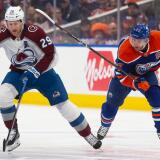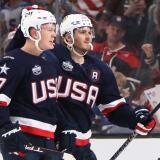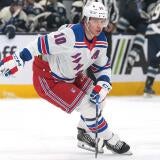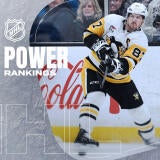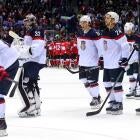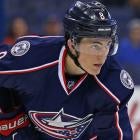Penguins' Stanley Cup window is still open with Crosby, Malkin ... for now
The Pittsburgh Penguins' championship window with Sidney Crosby and Evgeni Malkin is still open. For now.

The Eye On Hockey staff gets you ready for the NHL season by looking at some of the more interesting teams and storylines in the league for 2015-16. Next up, we take a look at the Pittsburgh Penguins and how their Stanley Cup window is still open. For now.
As soon as the Pittsburgh Penguins' quartet of top draft picks Sidney Crosby, Evgeni Malkin, Jordan Staal and Marc-Andre Fleury arrived there was a belief that they were going to be the foundation of a team that would go on to be a dynasty in the NHL.
Early on, it appeared as if they were going to easily follow that path. They reached the Stanley Cup Final in 2008 only to lose to a powerhouse Detroit Red Wings team in six games, and then returned the next year to win their first championship since 1992, defeating what might have been an even better Red Wings team in a memorable Game 7.
But in the years that followed that Stanley Cup win, the depth that made the the 2008 and 2009 teams such a force started to gradually slip away due to salary cap constraints, while the front office was unable to find suitable replacements. The result has been a top-heavy team that has had a handful of star players but not enough of a supporting cast to help get them back to the top of the NHL.
With a thin farm system, big salaries making up a large portion of the roster, and Crosby and Malkin now in their late 20s, the clock seems to be ticking on their chance to win another Stanley Cup in Pittsburgh.
There is a belief out there now, especially in Pittsburgh, that if their championship window hasn't already been slammed shut, that it's very close to happening. Especially after a first-round exit in 2015 when the team needed a win on the final day of the regular season just to get in the playoffs.
But thanks to their moves this summer they should still have a shot to win another championship with Crosby and Malkin still playing at a high level.
For now.
1. Crosby and Malkin can still be the driving force behind a championship team
When it comes to assigning blame for the Penguins' most recent postseason exits it usually tends to fall on the shoulders of Sidney Crosby and Evgeni Malkin.
They are the best players and highest paid players on the team, and when teams fall short that is always the first place people tend to look. And it's almost always the wrong place to start.
In the years that have followed their 2009 championship, no two players in the NHL have averaged more points per game during the regular season than Sidney Crosby (1.35) and Evgeni Malkin (1.15), and the only two players that are even remotely close to them are Alex Ovechkin and Steven Stamkos (both at 1.09. Nobody else is higher than 1.02 and there are only five other players in the entire league that top 1.00). If you only look at the playoffs over that same time period, their production does slip (as most scoring tends to do in the playoffs), but at 1.10 (Crosby) and 0.94 (Malkin) they are still among the six most productive players on a per-game basis in the entire league.
If you can't win in the playoffs with your two best players both averaging close to a point per game (or, in Crosby's case, more than a point per game), it's probably a pretty good sign that the problem isn't with them, but with the fact that the rest of your team simply isn't good enough.
And with the Penguins, that has absolutely been the case.
Sometimes it's been goaltending (though, not recently). Most of the time it's been a lack of secondary scoring and inability to support the two superstar centers, Crosby and Malkin.
When it comes to those two, most of the focus in recent years has been on their own personal scoring slumps at different times in the playoffs (both of them in 2013 against Boston; Crosby especially in 2014 against Columbus and New York) which only serves as a reminder that one of our biggest failings when it comes to analyzing hockey players is how much we ignore the fact that the best players don't score goals on a consistent basis. They score them in bunches, which are then followed by lengthy slumps. When the average NHL game only has four or five goals in it between two teams, and the winning team is only scoring two or three goals per game, there are only so many goals to go around and sometimes that means your best players are going to get shut out.
Jonathan Toews and the Chicago Blackhawks are the gold standard when it comes to winning in the salary cap era, and you can't mention Toews without also bringing up his clutch ability to score in big games. But if you look at his career in the postseason he's had many lengthy goal scoring droughts, including an almost unbelievable 19-game stretch in 2013 when he managed just a single goal. But because the Blackhawks roster was so unbelievably loaded from top to bottom, the team was able to keep rolling along and nobody remembered how everybody else carried the team offensively. Even in this year's Stanley Cup Final against Tampa Bay, Toews only scored a single goal in the six-game series. Anze Kopitar as just another example has been the best player on two Stanley Cup winning teams in the past four years, but he's only actually scored a goal in 16 of their 70 playoff games during that stretch.
The difference between teams like the Kings, Blackhawks and Penguins in recent years isn't the individual performance of their best players. They're all really good. It's the performance of the other players on the roster when the best players get shut down. And that is where the Penguins have been lacking.
It's the fact that when neither Crosby or Malkin is on the ice, they simply do not generate offense, especially at even-strength.
Over the past two years the Penguins have been outscored 124-87 during even-strength play when neither Crosby or Malkin is on the ice during the regular season. Their possession numbers in those minutes (46.7 Corsi Percentage) resemble a team that should in the draft lottery instead of the Stanley Cup Playoffs. And no, that's not exactly a shocking revelation that a team is worse when its two best players aren't on the ice.
But just remember that over the same time period Chicago was only outscored by 142-136 when neither Toews or Patrick Kane was on the ice. Los Angeles was an even 113-113 when neither Kopitar or Jeff Carter was on the ice. This past season the Ducks actually outscored their opponents by two goals this season (65-63) when neither Ryan Getzlaf or Ryan Kesler was on the ice.
That is what quality depth look like.
The Penguins didn't just get worse without Crosby or Malkin on the ice, they played like one of the worst teams in the league. And if the depth are getting outplayed that badly in the regular season, often times against teams that are not good enough to make the playoffs, why would things suddenly get better in the playoffs against better competition?
Naturally, they don't.
Over their past two postseason appearances the Penguins have scored 30 even-strength goals in 18 games. That's not a lot. But almost all of them were the direct result of one (or both) of Crosby or Malkin being on the ice and having an impact on the play. Only eight of those even-strength goals were scored when neither Crosby or Malkin was on the ice. That's just not enough from the rest of the team. You have to have players other than your top-two to chip in some offense every now and then because your best players, no matter how good they are, how well they play, or how hard they try, are not going to score every single night.
And that's where things might finally start to change this season.

2. They might finally have a decent supporting cast this season
Penguins general manager Jim Rutherford has been extremely busy this summer re-shaping his roster in the hopes of building a team that will have four lines that can score, something the Penguins have not had since their '09 Cup team when Miroslav Satan and Pascal Dupuis were regulars on the fourth line, while Jordan Staal, Tyler Kennedy and Matt Cooke formed the best third-line in hockey.
Over the summer Rutherford not only landed Phil Kessel, one of the best goal-scorers in the NHL, from the Toronto Maple Leafs, he signed Sergei Plotnikov, a talented forward out of the KHL to a low-risk contract and then swung another major deal to get Nick Bonino from the Vancouver Canucks, a move that was followed by the free agent signings of Eric Fehr and Matt Cullen.
Along with all of those moves the Penguins were also able to jettison Brandon Sutter, Nick Spaling, Craig Adams and Maxim Lappiere, the kind of players that were more often than not drains on their bottom-six. When you look at the forward roster the Penguins will have at their disposal this season, and then compare it to the forward rosters they had on the ice in elimination games in previous years (when the likes of Tanner Glass, Craig Adams, Brian Gibbons, Marcel Goc, Joe Vitale, Max Lapierre, Scott Wilson, Nick Spaling and Daniel Winnik were in the lineup) it's a night-and-day comparison. There really isn't a significant weak link up front and every line should have at least some threat of providing offense.
The losses of Paul Martin and Christian Ehrhoff are definitely going to impact the defense, and they still have some holes on the blue line that need to be addressed, but with Kris Letang and Olli Maatta returning this year after missing the postseason (and a significant portion of the 2014-15 season) they should have one of the best pairings in the league logging the biggest minutes.
They are taking a big gamble that youngsters like Derrick Pouliot (who showed some enormous potential at times last season) and Brian Dumoulin can take a big step forward, but there is at least some potential there for somebody to step up and improve.
The roster isn't perfect, but they have at least given themselves a fighting chance going into the 2015-16 season with the upgrades they made at forward, clearly their biggest area of weakness in each of their past three postseason exits.
3. They do have to win soon if they're going to get Crosby and Malkin another Cup
With all of that said, there does need to be some pressure on the Penguins to win in the very near future because at the moment they don't have a great long-term outlook beyond the next few years.
Crosby and Malkin are at a point where their production is going to start to slow down, and even though they should continue to be great players, they're probably not going to be able to cover up as many flaws as they have in the past (and they have covered up a ton).
They also have one of the thinnest farm systems in the league as a result of the number of prospects, and especially draft picks, that they have traded over the past few years. Other than their two first-round picks in 2012 (Pouliot and Maatta) just about every first-round draft pick they have had since 2007 has already made its way into the hands of another organization. At times, those trades have worked out in their favor (like when they dealt their 2007 and 2008 picks for Marian Hossa and Pascal Dupuis), and when done strategically it can help put a team over the top for a championship.
But when you do it every single season, and also start to trade second-and third-round picks, it's going to eventually take its toll on your organization. The biggest factor in building a strong farm system and consistent pipeline of talent to the NHL level is simply having a lot of draft picks every year to increase the chances of finding a player that can contribute.
The Penguins are starting to reach a point where they are going to feel the impact of their lack of draft picks.
[Data in this post via Puckalytics, War-On-Ice and Hockey-Reference]


